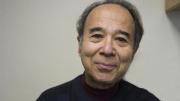The last Harvard-Radcliffe Orchestra (HRO) concert James Yannatos conducted, in the spring of 2009, ended with a performance of Brahms’s first symphony—a work that reads like an encyclopedia of emotional affect, from the throbbing anguish of its first measures to the sudden burst of ecstasy at the end of the last movement. On that particular night, the orchestra hurtled manically into the titanic crash of chords at the end, radiant with affection and energized by the man who had led the ensemble for nearly a half-century. Sanders Theatre itself seemed to vibrate warmly in sympathy, glowing almost as much as Yannatos himself on the podium, taking a final bow—which, as usual, he shared with the full orchestra.
On December 10, colleagues, former students, and his own family members returned to the stage that he so often occupied. They came to attend a “memorial celebration” of his life that mixed memories offered in words with music. His longtime colleague Jameson Marvin, who conducted the Harvard University Choirs for decades while Yannatos led the HRO, offered an informal biography of his friend, filled with many personal recollections. “It was Jimmy’s spirit, gentle and strong—with great warmth, kindness, humor, wisdom, and especially a warm core of spirituality—that drew me and countless friends to him,” Marvin observed.
He also reflected on his friend’s work as a composer, much of which he conducted during their joint tenure at the helms of their respective ensembles. Before leading a performance of Yannatos’s choral work “O Nata Lux de Lumine” (composed in celebration of the birth of grandchildren to each of them) at the memorial, he noted, “Light is the central core of this poignant composition. To me, it mirrors Jimmy’s core, his light—the guiding force of his remarkable humanity.” The choir sang the echoic, expansive piece solemnly, yet not without a certain inner joy: Alleluia, the voices prayed, overlapping one another in steady iteration and reiteration, nos membra confer effici tui beati corporis—“bring us to be made parts of Thy blessed body,” in words borrowed from medieval hymnody.
One grandchild, Isabel Yannatos, read a brief essay by her grandmother, Nyia Yannatos, in which she remembered meeting and falling in love with her husband. She attended a concert where one of his early compositions, a duo for violin and piano, was being performed. “In the middle of the second movement, he looked down and said to himself, ‘I’ve got her,’” she wrote. “Later that night, I called my mother and told her that I’d found the man I was going to marry.” Lynn Chang ’75 and Charlie Albright ’11 then performed the second movement of that duo, a meandering and delicate work that combines Ned Rorem-like rhythmic and textural gestures with a willingness to contemplate and investigate the emotional implications of a wide range of improvisatory gestures—carefree, impassioned, grandiose, and wistful.
The soprano Lucy Shelton, a longtime Yannatos collaborator, then sang Schumann’s song “Widmung,” accompanied by pianist Estela Olevsky. Afterwards, Ethan Gray ’05, who played cello in the HRO, spoke. “It’s such an honor to be here today, representing the thousands of students who were touched by the life of Dr. Y,” he said. “Dr. Y had no ego as a conductor. He wasn’t flashy; he didn’t dance or flail about.…He was the master of the small, meaningful gesture.”
Peabody professor of music emeritus Lewis Lockwood also spoke about Yannatos. They not only worked together, they also knew each other from adolescence onwards, having attended the High School of Music and Art in Manhattan (now LaGuardia High School of the Arts) together. “From the first day, I knew who Jimmy Yannatos was: the most gifted musician of our years there—a gifted violinist, already a talented conductor and composer—everybody’s idea of a young master.” His legacy is evident in his thousands of students, said Lockwood, and also in his extensive body of compositional work. “But it also lives on in all of us who knew him at close range, early or late, as a man and as a musician—our Jimmy, the kid from the South Bronx whose love of music never faded in a long and productive life.”
A group of students, present and former, played the emotionally harrowing second movement of Schubert’s string quintet, where apparent peace suddenly gives way to tremendous questioning, and returns just as suddenly to a peace transfigured on account of the emotional journey. The extensive meditation preceded closing words from Yannatos’s daughter, Kalya. “Although we are here today to celebrate his life, it is the story of his death that I feel compelled to share with you.…His final creative act of surrender is still rippling beyond the still point we often think of as death. Profoundly personal and intimate, the universal teaching he gave to us through his courage, awareness, and grace are a gift I trust the educator in him would grant me permission to share.…He found a steady focus, his eyes looking slightly upward, toward the light, or perhaps it was the little Buddha statue on the wall. Movement four: slow, larghissimo, quiet breathing, as the tempo of time passed, and then seemingly paused while Dad seemingly danced on the threshold of two worlds.…Suddenly, a clear inhale: Dad’s arm floated up for one last gesture, one last reach into this world that he so touched—and then, riding the wave of his last long exhale, his hand floated back, to his heart, his beautiful heart. In that moment, I learned the meaning of the expression, ‘breathtaking.’”
The memorial celebration closed with the recording of the Agnus Dei from Yannatos’s Trinity Mass, which Marvin earlier called “his masterwork.”









